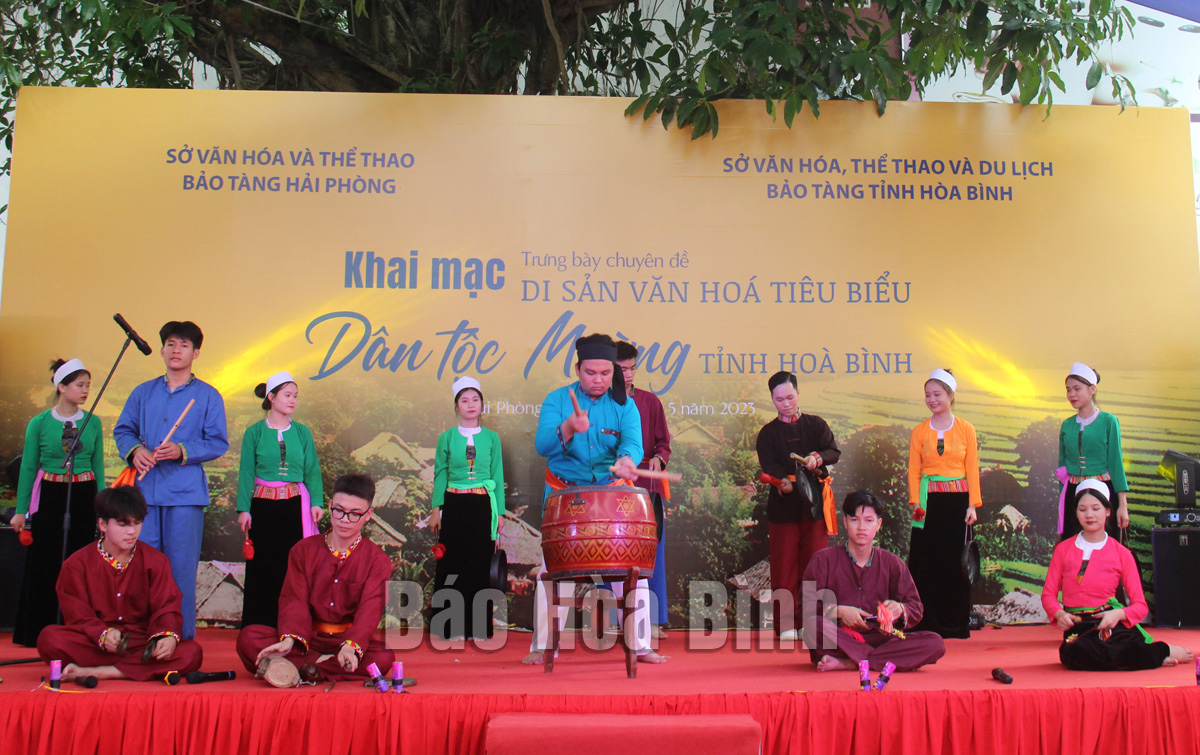



A special art performance performing at the opening of the thematic exhibition named "Typical Cultural Heritage of Muong ethnic group in Hoa Binh province”.
At the thematic exhibition named "Typical Cultural Heritage of Muong ethnic group in Hoa Binh province”, there are more than 250 original documents, artifacts, and photos introducing 4 typical intangible cultural heritages of Muong ethnic group in Hoa Binh province, which has been included in the National Intangible Cultural Heritage List, including: the art of Muong gongs and Mo Muong, Doi calendar knowledge (bamboo calendar) and Khai Ha festival of Muong ethnic group; introduction to the collection of the ancient pottery in Muong tombs; the collection of bronze drums and antique bronze objects; the traditional handicrafts of Muong ethnic group and 7 types of intangible cultural heritages of Muong ethnic group in Hoa Binh province, including: spoken language - hand writing, folklore, social practices, folk knowledge, traditional festivals, folk performing arts.
In the cultural heritage of Vietnam's ethnic groups, the Muong ethnic cultural heritage has a bold mark in many areas, clearly reflected in the architecture of the stilt houses, the national costumes, the culinary culture, in the historical and cultural relics, antiquities and in the fields of customs and habits, festivals, beliefs, religions, voices, music, performing arts... Muong people in Hoa Binh are always proud of the fact that it has been the cradle of the famous "Hoa Binh Culture” for more than two thousand years ago today.
The students in Hai Phong city are interested in learning about Hoa Binh culture.
The exhibition takes place from May 10 to the end of June 10. Hai Phong residents and visitors are immersed in gong concerts, unique songs, dances, and typical dishes having the taste of the mountains and forests such as Lam rice, food displayed on leaves, Can alcohol... Thereby, it helps introduce the beauty and good traditional cultural identity of Muong ethnic group in Hoa Binh province to the officials and people in Hai Phong and tourists, contributing to honor and promote the cultural identity of Muong ethnic group in the community of ethnic groups in Vietnam...
At the end of May, the Hoa Binh Provincial Ethnic Arts Troupe organized a series of performances for residents in Region 2 and Region 3 communes across the province. Bringing art to ethnic communities in remote, isolated, and especially disadvantaged areas has become a meaningful activity. These are not merely artistic performances but also journeys to disseminate cultural values, enrich spiritual life, and contribute to preserving the cultural identity of ethnic minorities.